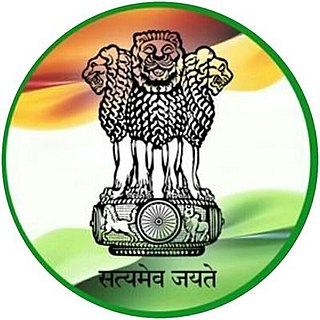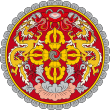
Bhutan has diplomatic relations with 56 of 193 member states of the United Nations and the European Union. Bhutan's limited number of such relations, including the absence of formal relations with any of the permanent members of the United Nations Security Council, is part of a deliberate isolationist policy of limiting foreign influence in the state. This stance has been safeguarded by close relations with India, of which Bhutan has previously been considered a protected state.

The Ministry of Foreign Affairs is an executive department of the Government of Japan, and is responsible for the country's foreign policy and international relations.
Diplomatic rank is a system of professional and social rank used in the world of diplomacy and international relations. A diplomat's rank determines many ceremonial details, such as the order of precedence at official processions, table seatings at state dinners, the person to whom diplomatic credentials should be presented, and the title by which the diplomat should be addressed.

The Indian Foreign Service (IFS) is a diplomatic service and a central civil service of the Government of the Republic of India under the Ministry of External Affairs. The Foreign Secretary is the head of the service. Vikram Misri is the 35th and the current Foreign Secretary.

The Department of Foreign Affairs is the executive department of the Philippine government tasked to contribute to the enhancement of national security, protection of the territorial integrity and national sovereignty, to participate in the national endeavor of sustaining development and enhancing the Philippines' competitive edge, to protect the rights and promote the welfare of Filipinos overseas and to mobilize them as partners in national development, to project a positive image of the Philippines, and to increase international understanding of Philippine culture for mutually-beneficial relations with other countries.

The Ministry of Foreign Affairs is the governmental body responsible for conducting foreign relations of the Republic of Turkey. The Ministry is responsible for Turkey's diplomatic missions abroad as well as providing support for Turkish citizens and promoting Turkish culture. The ministry implements Turkish foreign policy in accordance with the country's national interests. Established on 2 May 1920, its primary duties are administering diplomatic missions, negotiating international treaties and agreements, and representing the Republic of Turkey at the United Nations. The ministry is headquartered in the Turkish capital of Ankara and counts on more than 200 missions as embassies, permanent representation offices and consulates general, abroad. As of 2021, the Ministry of Foreign Affairs maintains 235 diplomatic posts worldwide. The current Minister of Foreign Affairs is Hakan Fidan, who has held the position since 3 June 2023.

Ministry of Foreign Affairs of Azerbaijan is a Cabinet-level governmental agency of Azerbaijan Republic in charge of conducting and designing the country's foreign policy.

The Federal Public Service Foreign Affairs, Foreign Trade and Development Cooperation is the foreign affairs ministry of Belgium and is responsible for Belgian foreign policy, relations with the European Union, development cooperation policy and certain aspects of foreign trade policy. The central government in Brussels directs the network of diplomatic and consular representations abroad.
The Ministry of Foreign Affairs is a cabinet ministry of the Government of Sri Lanka responsible for conducting and managing Sri Lanka's foreign relations through oversight of its missions abroad via the Sri Lanka Overseas Service, as well as drafting and general implementation of the nation's foreign policy.

The Ministry of Foreign Affairs is one of the fourteen ministries of the Government of Moldova.

The Ministry of Foreign Affairs of the Republic of Belarus is the Belarusian government ministry which oversees the foreign relations of Belarus.

The Ministry of Foreign Affairs of the Republic of Serbia is the ministry in the government of Serbia which is in the charge of maintaining the consular affairs and foreign relations of Serbia. The current minister is Marko Đurić, in office since 2 May 2024.

The Ministry of Foreign Affairs, abbreviated KLN, is a ministry of the Government of Malaysia that is responsible for foreign affairs, Malaysian diaspora, foreigners in Malaysia, diplomacy, foreign relations, counter terrorism, bilateral affairs, multilateral affairs, ASEAN, international protocol, consular services, maritime affairs, and chemical weapons. It is currently based in Putrajaya. It is also widely known as Wisma Putra, which is also the name of its building in Putrajaya.
Ruchira Kamboj is a retired Indian Foreign Service officer of the 1987 batch, who last served as India's Permanent Representative to the United Nations from August 2022 to May 2024 until her retirement. She has previously served as High Commissioner of India to South Africa, first female Indian Ambassador to Bhutan and Ambassador/Permanent Representative of India to UNESCO, Paris.
The Ministry of Foreign and European Affairs of the Republic of Slovenia is an executive department of the Government of Slovenia responsible for relations with other countries and international organisations, monitoring of the international political and economic situation, and strengthening of Slovenia's relations with other countries and international organisations.

The Chief of Protocol (CoP) is a government official who heads the protocol department of a state, overseeing security, logistics and etiquette in diplomatic and national functions. A protocol department decides on diplomatic immunity and privileges, diplomatic host security, diplomatic use of airspace and it is the guardian of official etiquette. Advance protocol teams, usually headed by the Chief of Protocol, engage as first contact between governments for the planning of bilateral and multilateral summits and visits.
Kunzang Chhoden Namgyel became Bhutan's first female ambassador and the country's permanent representative to the United Nations in January 2014.

Bhutan–Germany relations are the bilateral relations between Bhutan and Germany. Germany has a non-resident embassy housed in New Delhi. Bhutan is represented in Germany by its embassy in Brussels. Both Germany and Bhutan have honorary consuls in each of their countries.

























